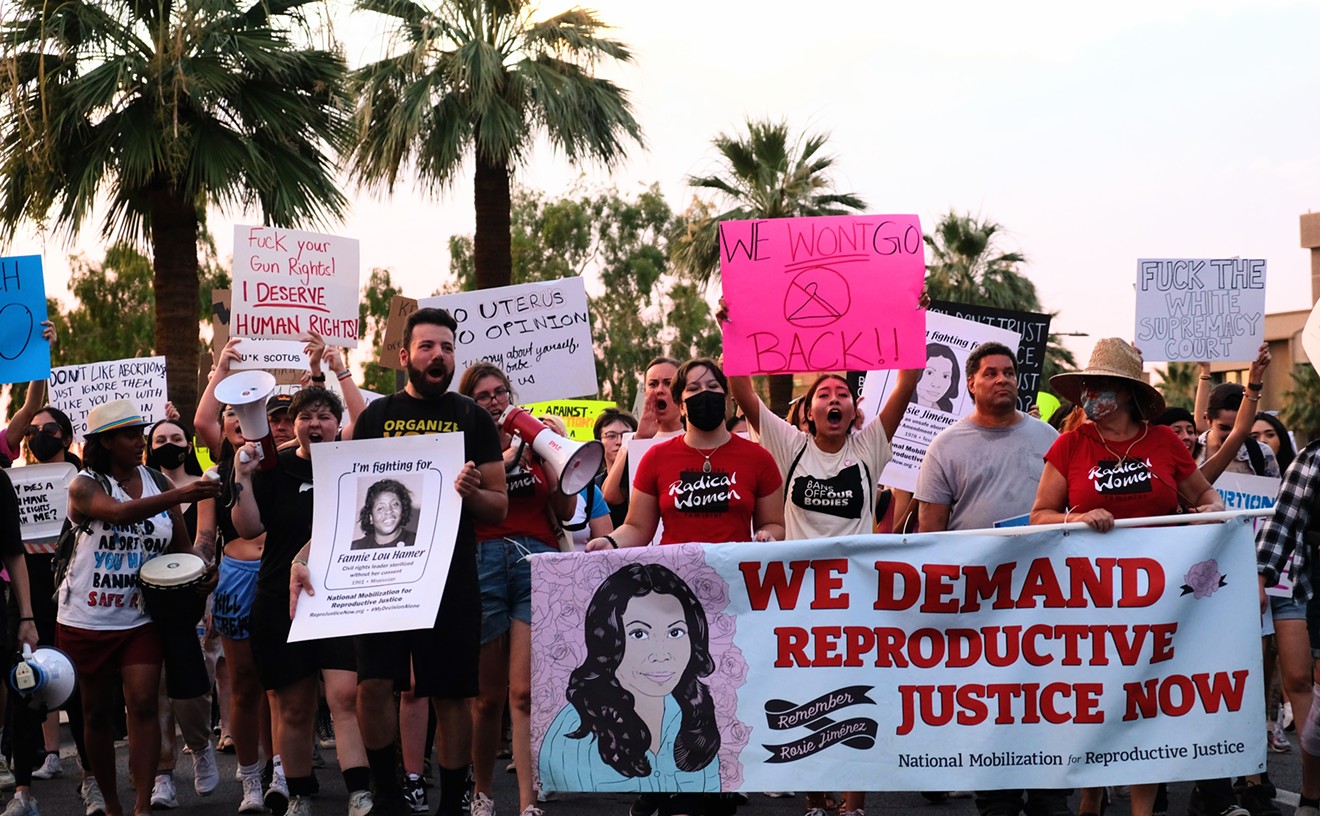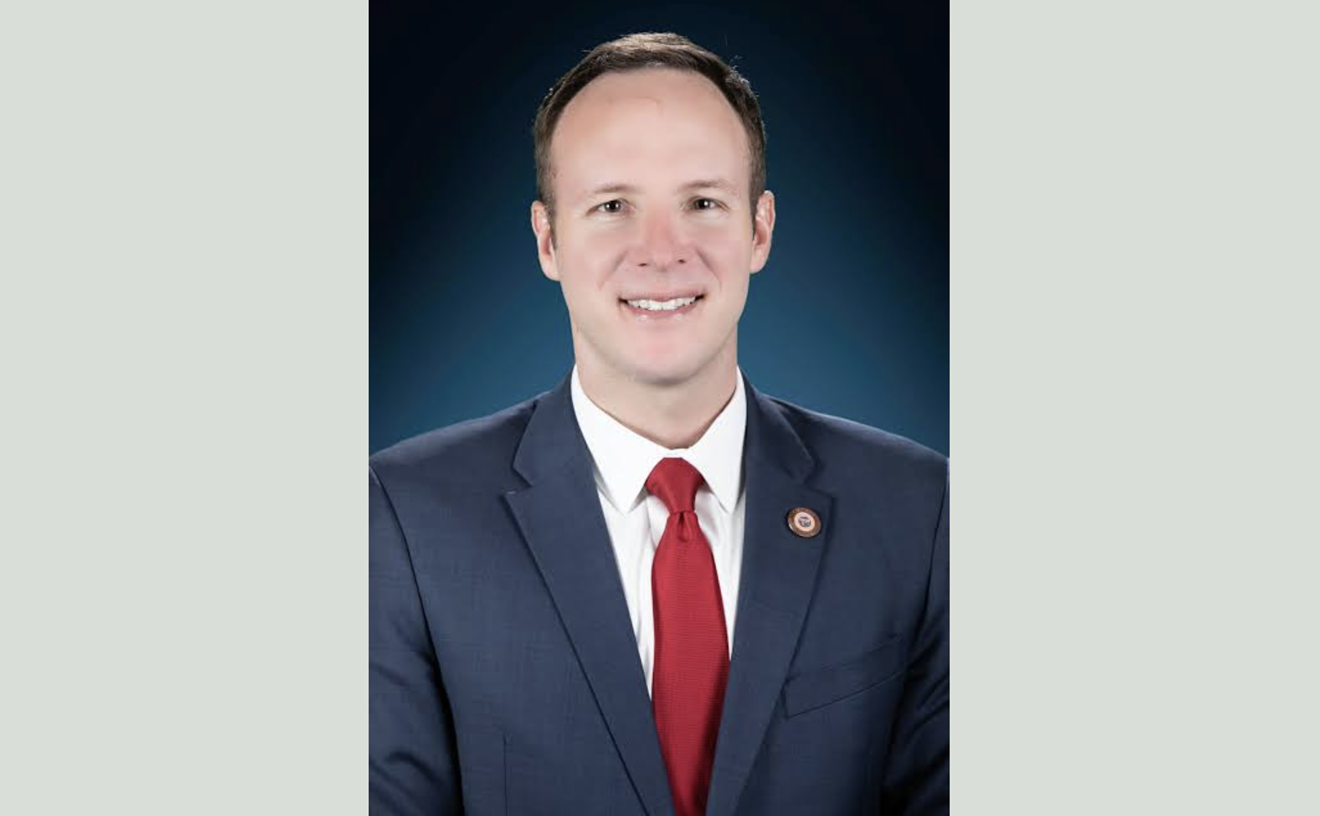A Maricopa County Superior Court judge sent Dean Mark Brewer, 42, to a Department of Corrections facility in Douglas on June 24. Brewer pleaded guilty to ten felony counts stemming from the diversion of millions of dollars from the defunct title company's escrow accounts from 1991 to 1993.
Brewer foreshadowed his fate in a December 1993 interview with New Times, saying those responsible for plundering Charter Title "are going to hang."
Brewer has since admitted he illegally diverted the money from escrow accounts, but he claims in court records that he had an accomplice. Brewer insists that his former business partner, R. Bruce Harshey, knowingly participated and benefited from the theft.
"The defendant stated Bruce Harshey was involved in the diversion of funds from the beginning," a presentence memorandum prepared by Maricopa County probation officer Brian Coglan states.
Harshey is identified in the document as an "unindicted co-conspirator." Efforts to reach Harshey were unsuccessful. In a 1995 New Times interview, however, Harshey said he was duped by Brewer and was unaware of the diversion of funds.
A spokeswoman for the Arizona attorney general says Brewer's allegations against Harshey remain unconfirmed. "Allegations need to be sufficiently corroborated to ensure a reasonable likelihood of conviction," says Karie Dozer.
Brewer's presentence memorandum, however, portrays both men as co-conspirators bent on tapping Charter's escrow accounts. The memo states that in June 1991, shortly after they purchased Charter Title Company (formerly known as Arizona Escrow and Title), Brewer and Harshey realized the company was doomed because of cash-flow problems.
"It was at that time that he [Brewer] and Harshey agreed to use escrow funds to operate the company, with the intention of replacing the funds," the presentence memorandum states.
Court records show that approximately $5 million of the $8 million diverted from the company went into Charter Title's operating accounts.
However, much of that money was spent extravagantly--on premier salaries; trips to the Super Bowl, Kentucky Derby and the NCAA Final Four; lavish parties; $1,500 tips to topless dancers; a luxury yacht.
The men diverted the funds, the memorandum says, by using the company's computer system to transfer money from the escrow accounts.
"The unauthorized transfers were accomplished by the defendant, giving the necessary information about the unauthorized transfers to Harshey, who would provide the secondary information to consummate the transfer," the presentence memo states.
By August 1993, Brewer allegedly showed Harshey that approximately $2 million had been "illegally transferred" from escrow accounts, according to the memorandum.
Brewer claims in court records that Harshey "was getting money whenever he wanted it." Harshey allegedly used Charter Title escrow funds to pay his American Express card bills, rent on a personal apartment and payment for a luxury automobile.
Harshey's alleged diversions pale in comparison with Brewer's. Nearly $1 million in escrow funds went toward Brewer's purchase and upkeep of a 110-foot yacht, The Crystal.
Brewer also paid himself $496,000 from escrow funds, bought $204,000 worth of stock in a Scottsdale company called Interactive Media Technologies, paid $176,000 for skyboxes at America West Arena, $210,000 on a homebuilding company he created and $125,000 to pay legal fees related to civil suits against him in California.
"Of the $8.1 million diverted from Charter, a $3.833 million total appeared to be used for extravagant personal expenses, personal gifts or personal investment on behalf of defendant," the presentence memo states.
Charter Title was seized by state Banking Department regulators in October 1993. The company's collapse left thousands of investors--small and large--in limbo as their down payments on homes, tax bills and other accounts were frozen.
State banking superintendent Richard Houseworth told the court that Charter's collapse and its subsequent placement in state receivership has cost taxpayers $837,000, with additional outlays expected. "The unwinding of Charter Title continues to be a monumental undertaking," Houseworth says.
Lax state oversight of Charter's operations appears to have contributed to the state's losses. Brewer had already filed for personal bankruptcy and his former California mortgage company was under federal criminal investigation when he moved to Arizona in 1990 and purchased the assets of Arizona Escrow.
While the state Banking Department never approved Brewer's purchase of Arizona Escrow, the department did not stop him from operating the company. Brewer simply had Harshey hold the stock in his name. A review of Banking Department records found no records related to Harshey's application for an escrow license.
The Banking Department also routinely approved Charter's requests to open branch offices and ignored warnings from Charter employees that the company was in trouble.
By the time the department finally acted, it was too late.
Charter's failure threw about 100 people out of work. Many discovered that their health-insurance coverage had lapsed because Brewer failed to pay premiums.
Some Charter employees also lost money because Brewer failed to forward their 401(k) contributions to the plan administrators.
The biggest loser in Charter's demise is First American Title Company, which agreed to underwrite Charter's accounts in 1991 after Harshey asked a former First American executive--a relative of his by marriage--for assistance.
It's uncertain whether the executive, who has since retired, had a direct role in First American's decision to underwrite Charter Title's accounts, says First American corporate counsel John Graham.
But First American's decision to back Charter Title has cost First American more than $5 million in losses and attorney fees, Graham says.
The balance of Charter's losses--approximately $3 million--was covered by a state recovery account funded by contributions from Arizona title-and-escrow companies. Those law-abiding companies now must replenish the fund.
Prior to Brewer's sentencing, Maricopa County Superior Court Judge Stephen Gerst held a mitigation hearing to consider Brewer's request that he be placed on probation rather than sentenced to prison.
Mesa clinical psychologist Ann E. Harris told the court that Brewer diverted the funds to protect the jobs of his employees. She also noted that Brewer suffers from a disorder that requires that he receive constant positive reinforcement from others.
"I do not believe Mr. Brewer acted in these circumstances with criminal intent," Harris stated.
Brewer stated in the presentence memorandum that he knew he needed help, but failed to get it.
"It was my ego and not wanting to share my problems with others," Brewer stated. "I had 100 people working for me and I let all these people down. I just made some bad choices."
But if Brewer was seeking pity from his former employees, he found little. A score of letters from former employees and title-industry workers asked the judge to lock him up for as long as possible.
"I urge you to sentence Dean Brewer to the maximum sentence," former Charter employee James Urbanski wrote the court. "Even that may not be enough.










